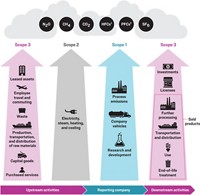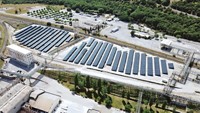Advertisement
Grab your lab coat. Let's get started
Welcome!
Welcome!
Create an account below to get 6 C&EN articles per month, receive newsletters and more - all free.
It seems this is your first time logging in online. Please enter the following information to continue.
As an ACS member you automatically get access to this site. All we need is few more details to create your reading experience.
Not you? Sign in with a different account.
Not you? Sign in with a different account.
ERROR 1
ERROR 1
ERROR 2
ERROR 2
ERROR 2
ERROR 2
ERROR 2
Password and Confirm password must match.
If you have an ACS member number, please enter it here so we can link this account to your membership. (optional)
ERROR 2
ACS values your privacy. By submitting your information, you are gaining access to C&EN and subscribing to our weekly newsletter. We use the information you provide to make your reading experience better, and we will never sell your data to third party members.
Sustainability
ChemSec hands out sustainability report cards to industry
Nonprofit wants to direct investors to firms making safer chemicals
by Craig Bettenhausen
June 18, 2020
| A version of this story appeared in
Volume 98, Issue 24
It’s hard to find a chemical company that doesn’t at least talk about sustainability. ChemSec aims to cut through the noise with its ChemScore report cards, which the Swedish nonprofit released this week. ChemSec graded the top 35 chemical companies on the basis of what they make, their efforts toward developing safer alternatives, their transparency about ingredients, and the accidents or other scandals they’ve faced.
Report card
ChemSec ranked the 35 largest publicly listed chemical companies based on production of hazardous chemicals, development of safer alternatives, transparency, and controversies.
▸ 1 DSM: B
▸ 2 Indorama: B–
▸ 3 AkzoNobel: C+
▸ 4 Linde: C+
▸ 5 Johnson Matthey: C
...
▸ 31 PTT Global Chemical: D
▸ 32 Formosa: D
▸ 33 Umicore: D
▸ 34 Sasol: D
▸ 35 Sinopec: D
Note: Based on 2018 revenue
The Dutch life sciences and materials firm DSM topped the field with a grade of B and a score of 29 out of a possible 48 points. DSM produces 10 chemicals on ChemSec’s “SIN” list, short for “substitute it now,” but is working hard on developing safer chemicals and has no significant controversies, according to the report card.
In contrast, the Belgian metals and materials company Umicore was third from the bottom with a grade of D and a score of 7. The firm says COVID-19 prevented it from participating fully in ChemSec’s research. We will “look into the approach and outcome of the study and we will see what learnings Umicore can take on board,” Umicore says.
ChemSec says its main goal with the ChemScore program is to drive investors toward more sustainably minded companies. Pure Strategies, a chemical sustainability consulting firm, applauds ChemSec framing the issue around financial performance. “Chemical companies that have plans and timelines for producing safer alternative materials are clearly long-term better investments,” Pure cofounder Robert L. Kerr says.
Such rankings can be useful to understand companies relative to one another, says David Chichester-Constable of the American Chemical Society’s Green Chemistry Institute. ACS publishes C&EN. It’s important, however, to understand their methodologies and biases. ChemSec emphasizes transparency, Chichester-Constable says, so the rankings are biased towards the degree of transparency a company maintains.
Correction
This story was updated on June 19, 2020, to correct two name errors. The consulting firm quoted is Pure Strategies, not Pure Solutions. Number 31 in the ranking is PTT Global Chemical, not PPT.




Join the conversation
Contact the reporter
Submit a Letter to the Editor for publication
Engage with us on Twitter